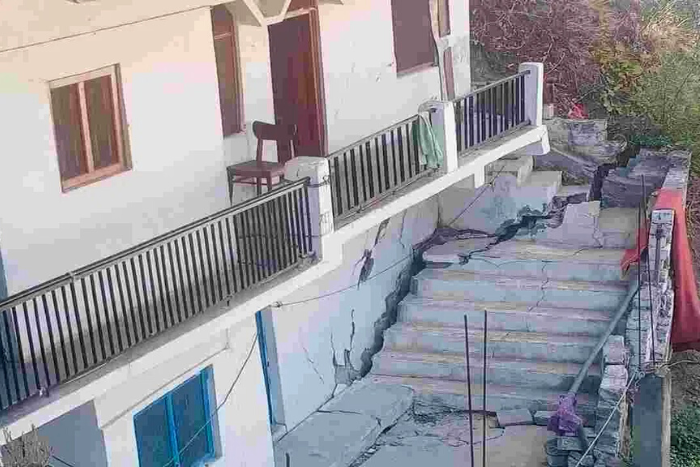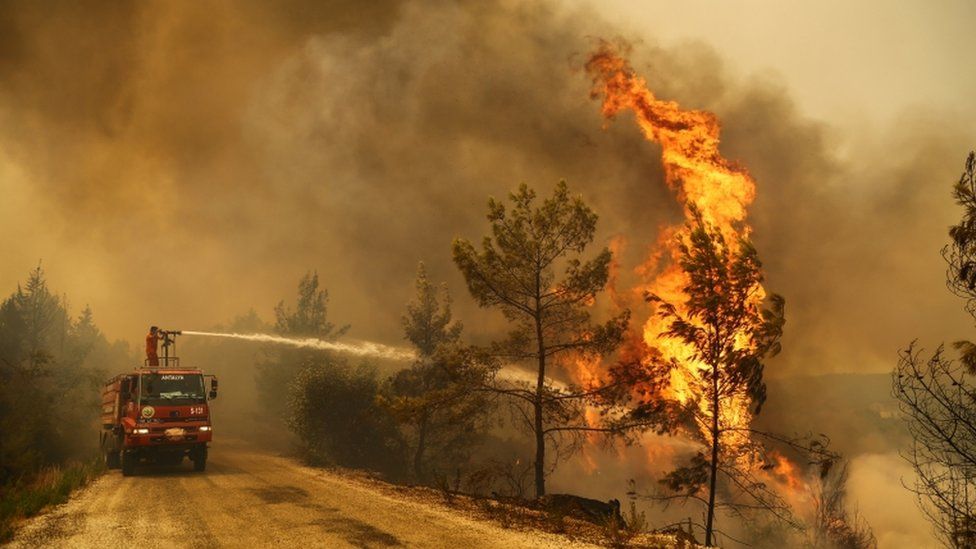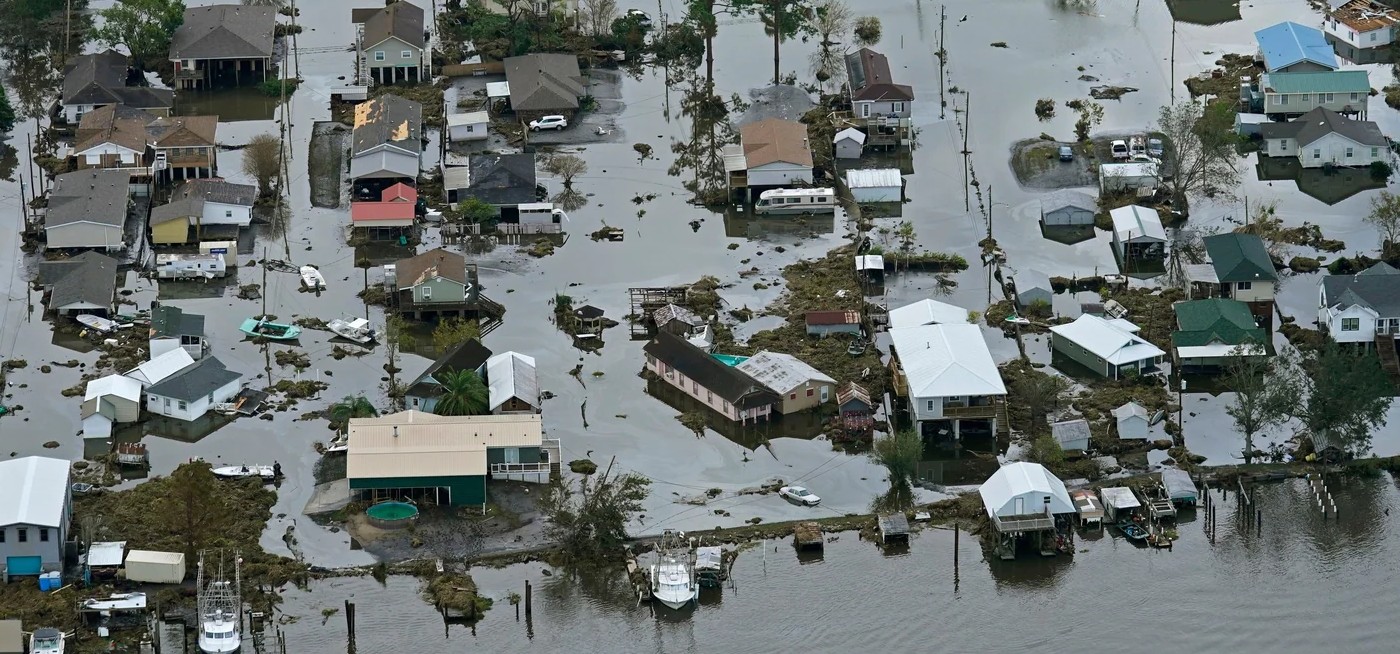Joshimath subsidence demonstrates risks of unplanned, rampant development in fragile areas: Experts
NTPC in particular has been called out for its unchecked development in vulnerable areas exacerbating the impacts of climate change, which is a force multiplier. Joshimath is a clear example of what should not be done in the Himalayas, say experts
By Editorial Team / Jan 11, 2023

Massive cracks developing at houses in Joshimath. Photo: @sdcfoundationuk/ Twitter
Joshimath, a small town in the Chamoli district of Uttarakhand, has been under the spotlight ever since massive cracks emerged in hundreds of homes and roads a few days ago. The “sinking town” has now been declared disaster-prone due to increasing land subsidence.
About 82 families have been relocated and around 678 houses have developed cracks. Currently, medical staff are performing door-to-door health checks of the population in addition to providing relief camps and dry ration kits.
Experts and locals unequivocally blame National Thermal Power Corporation’s (NTPC) Tapovan Vishnugad Hydro Power Project and other such development projects in the fragile Himalayan set up. However, NTPC released a statement earlier denying the claim. They said that the tunnel built does not pass under Joshimath town. This tunnel is dug by a tunnel boring machine (TBM) and no blasting is being carried out presently, the statement added.
Why is town sinking?
Joshimath is situated on the debris of a landslide, lying on a sand and stone deposit rather than on rock. This is not the first time that houses in Joshimath saw cracks in their walls. Few houses had already reported cracks back in 1971, post which a report in 1976 by the government appointed Mishra Commission had suggested few measures that included conservation of the existing trees and plantation of more trees, boulders on which the town is located should not be touched and Reinforced Cement Concrete (RCC) should not be done.
However, these measures were never followed. Several experts have cited that traditional housing construction technologies are able to withstand earthquakes and landslides much more strongly than new constructions. Given the current situation now, the Uttarakhand government has imposed a ban on all construction activities in and around Joshimath. The building of the hydropower project and the Border Road Organization’s (BRO) Helang bypass were also prohibited by an order from the Chamoli district administration.
NTPC’s 520 MW hydropower project, Tapovan Vishnugad, in particular, has come under heavy fire. The “run-of-river” project involves diverting streams of water from the Dhauliganga tributary of the Alaknanda river to four turbines. For this, NTPC has been carrying out extensive drilling through mountains in and around Joshimath, in Chamoli district.
Commenting on the state of affairs, Atul Satti, a local environmental activist, said,”We have been repeatedly warning authorities about the irreparable damage caused due to several tunnel and hydropower projects in and around Joshimath and other parts of Uttarakhand. However, our voices were blatantly ignored and our worst nightmare has come true today. The entire responsibility of Joshimath caving in is on NTPC’s Tapovan Vishnugad Hydro Power Project. Continuous blasting in the tunnels has shaken the foundation of our town.”
This is not the first time NTPC’s Tapovan project has come under the scanner for being ill-suited for the region. In early 2021, a power station connected to the project was washed away in the wake of flash floods triggered by heavy rains and dislodged glacier debris. Over the 14 years of the project’s existence, construction has been plagued by delays with repeated technical snags, as well as recurring questions over safety and environmental prudence.
Unchecked development in a fragile ecosystem is the root cause of the problem that Joshimath faces today. Anjal Prakash, research director and adjunct associate professor, Bharti Institute of Public Policy, Indian School of Business and Lead Author for IPCC Reports said, “I am very much convinced that the Joshimath caving incident is caused by the hydro power project which has been operational in building the tunnel and was the major cause of concern for the residents. It has shown that water which has gushed out is from a fractured zone which has been punctured by the tunnel that has been leading to the devastating situation that we are in today. The return investment cost in hydropower projects is very less when compared to the cost associated with environmental and ecological damage. Joshimath is a clear example of what one should not do in the Himalayas.”
Experts have cited anthropogenic activities as a primary reason for the ongoing crisis. “The population has increased manifold and so has the tourist landfall. Infrastructure has also amplified and has been unchecked. However, the town does not have a proper drainage system. Besides gradual weathering of fine material between the rocks of debris, water percolation has decreased the cohesive strength of the rocks over the time. This has resulted in landslides, triggering cracks in the houses. Secondly, construction of these tunnels for Hydro power projects is being done through blasting, creating local earthquake tremors, shaking debris above the rocks, again leading to the cracks. Government has not learnt anything from the disasters of Kedarnath floods in 2013 and Rishi Ganga flash flooding in 2021. The Himalayas is a very fragile ecosystem,” said Y P Sundriyal, head of department, Geology, HNB Garhwal University.
Most parts of Uttarakhand are either located in seismic zone V or IV which are prone to earthquakes. Experts said that climate change is further worsening the matter, with more extreme weather events. There’s a need to have the formation of some strong rules and regulations and moreover forced and timely implementation of these rules. “We are not against development but not at the cost of disasters,” added Sundriyal.
Watch our video on Joshimath in Hindi here.
The article was first published in CarbonCopy.
Climate Impact Joshimath sinking Climate Change

